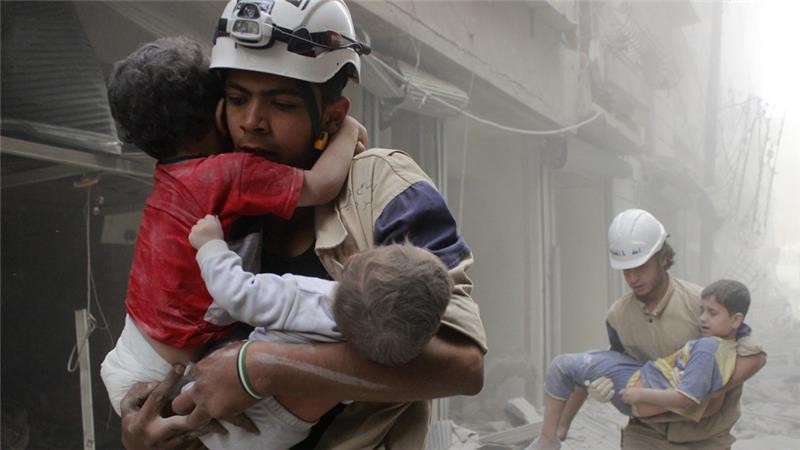
A new documentary film White Helmets challenges media’s stereotypes of Arab men

His hair is in disarray, a bright ruby smear across his face. The loud orange of his surroundings only serves to heighten the dust, blood and confusion on his person, on his little, five year old body: hands resignedly placed in his lap, shoulders sloping down, tiny little toes peeping out from the lower horizon of the shot. You may recall seeing a picture of this boy, Omran Daqneesh, splashed across social media and news publications. Just moments before, Omran found himself in the rubble of yet another building razed to the ground by Russian or Syrian war planes.
Since its commencement, the war in Syria has resulted in the deaths or displacement of nearly 11 million individuals. Omran is one of at least 60,000 people that the Syrian Civil Defence have rescued, a motley crew of average men who brazenly go where few others would venture: straight into the mouth of the bomb blast. The wombs of devastated buildings like Omran’s sometimes hold dozens of helpless victims, some dead, others alive. The opening scene of White Helmets is one you could not forget, for it shows precisely the kind of terror and despair these men must overcome to do their work. Plumes of debris and smoke rise up on a street as plain clothed young men rush into a building that has just been attacked. Inside, broken beams intersect the passageway, shards of glass shatter underfoot. Two young girls found within are being carried out by these ordinary heroes, but the shaky ‘Allahu Akbars’ the men are shouting betray how they truly feel. And just like that, the unmistakable sound of an incoming bomb heralds the explosion that follows mere seconds later, engulfing the screen, the rescuers and those little girls in an opaque haze.
The war in Syria is an uncomfortable truth that many of us avoid. But occasionally, an iconic, soul-shaking image or story will flood the media till we are left with no choice but to confront this harsh reality that we all too often are able to ignore from the comforts of our homes.
The Netflix documentary White Helmets by director Orlando von Einsiedel, is a brief but telling 40 minute look into the lives and rescue missions that these former teachers, tailors and carpenters undertake during five weeks of filming. Three volunteers in particular deliver their accounts to the audience, and perhaps the most striking part of the documentary is how these young, soft-spoken, family men champion an almost hopeless yet unwavering optimism that better days will come. "The morale of the White Helmets is always high," states Abu Omer, his face taut, his voice grim.
Unsurprisingly, for a film that is shot in an active war zone, most of the footage is from grainy hand-held cameras. We are almost wholly consumed in this alternate reality, where most buildings are hollowed out carcasses, whole chunks of them gouged out by barrel bombs, covered in a grotesque grey-brown.
Perhaps one of the greatest successes of this documentary is that it takes iconic images, like Omran’s, and humanises them by providing a frame of reference for its audience.
We don’t just see an innocent little boy who has somehow survived the clutches of death, we also see the men who stood outside on the street, tracking the movements and sounds of an incoming jet, watching as a missile or bomb is launched onto an unsuspecting neighbourhood. We sit transfixed as we see these men hurl themselves first into dilapidated vans that screech down desolate streets, and then throw themselves into buildings that are little more than heaps of rubble in their quest for saving innocent souls.
Formed in 2013, the group comprises of 2,900 civilian volunteers across 120 centres in the country. These men have been nominated for a Nobel Peace Prize, and rightly so, as often they are nothing short of miracle workers who perform the near impossible task of giving hope to the hopeless.
In one scene, the men are searching for the dead in a small village near Aleppo. But to their shock and amazement, the unmistakable squeal of a newborn pierces through the near impenetrable fortress of debris. Through their unrelenting efforts over 16 hours, armed with little more than flashlights and their bare hands, the men are able to rescue Mahmoud, the ‘Miracle Baby’. They rejoice, tears in their eyes, and even in the devastation and desolation of a home reduced to a pile of rocks, the bright blaze of hope burns fiercely in that moment.
White Helmets serves the important function of challenging the media’s stereotypes of Arab men. These are not the religious fanatics that propagate terrorism in the West, nor do they maintain any kind of criteria for whom they rescue. The film itself transcends its reductive categorisation; rather it is a transformative experience for the viewer who is able to overcome the desensitised response that often accompanies information we glean off social media or news online. Through the lens, we come face to face with the true extent of anguish in Syria, and this time it cannot be ignored.